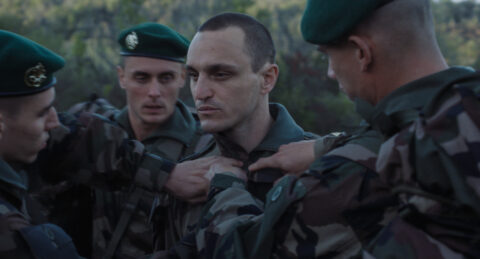In 1999 Claire Denis released a perfect movie.
A perfect combination of actor and screenplay. A perfect combination of cinematography and setting. A perfect combination of music and movement. It’s been 24 years since then, but Beau Travail has cast a wide influence over arthouse cinema. Or is it more like a curse?
Enter Disco Boy (Giacomo Abbruzzese, 2023), a film so enamoured with Beau Travail it basically ends up remaking it, right down to the very last scene. An ode to the dance, to the majesty and beauty of the Niger Delta, to the possibilities available in the French Legion, and to sublimated homosexual energy, it’s filled with decent ideas, but with zero energy between the mugging and the beauty.
Franz Rogowski, the face of modern cinema, with a rugged visage that recalls Denis Lavant, plays a Belarusian, Alexei, escaping to Fortress Europe. I was wondering how his Russian was going to sound. The film gets around these problematic elements by having him speak very little. When he finally mumbles молодец (good job/beau travail) he sounds like an old, drunkard. Nonetheless, he’s a highly physical actor, embodying his character with deep, thoughtful movements that are the complete opposite of his appearance in Passages (Ira Sachs, 2023).
After crossing the Polish border under the guise of supporting a football team, he hitches a ride with a truck driver, making an exaggerated, torturous journey to France, where he joins the French Foreign Legion. In some powerful inductive scenes, his army instructor explains that it doesn’t matter where the recruits are from, as long as they commit their bodies and minds to the French cause. Soon Alexei — now known as Alex instead of a natural diminutive like Lyosha or Sasha — finds himself in the Nigerian delta, where his fate intersects with a group of terrorists headed by Jomo (Morr Ndiaye).

It’s slow, contemplative tone also recalls Chantal Akerman’s Allmayer’s Folly (2011), refracting a classic Heart of Darkness narrative to give a metaphysical reflection on the follies of exploitation. These men aren’t protesting any government per se, but the interests of transnational corporations. Beautiful drone shots of the environment, with CGI inserts of factories in the background, show how the natural, native, lush world of Nigeria has been taken over by the West, with foreign legionnaires necessary to protect capitalism at any cost.
This is all ripe material for a great film, but Disco Boy is excruciatingly self-important and boring. The mise en scéne is lazy, the editing aiming at profound juxtapositions while creating little narrative or emotional momentum. And the understanding of Slavic, Eastern European identity is completely underdeveloped. It’s true that Alexei needed to be both an illegal and white for the colonial narrative to work — and probably needed Rogowski to get funding — but the final result is essentially Slavic cosplay. Belarusians are among the most misunderstood people in the world. They deserve to be cast in their own stories. I can’t speak to the portrayal of Africa, but I can’t imagine it will be kind either.
Vitalic, providing the soundtrack, gives the feeling a feeling of existential, mystical beauty, using a mixture of stabbing synth sounds and epic layers that recalls Scarface (Brian De Palma, 1983). One of the great electronic artists, he helps to pull a con job over susceptible eyes. But the final effect is less “The Rhythm of the Night” and more “Blue (Da Ba Dee)” — the sound of the club for sure, but never transcending its novelty to actually become something interesting. I hope they send Denis her royalty checks.
Redmond is the editor-in-chief of Journey Into Cinema.





